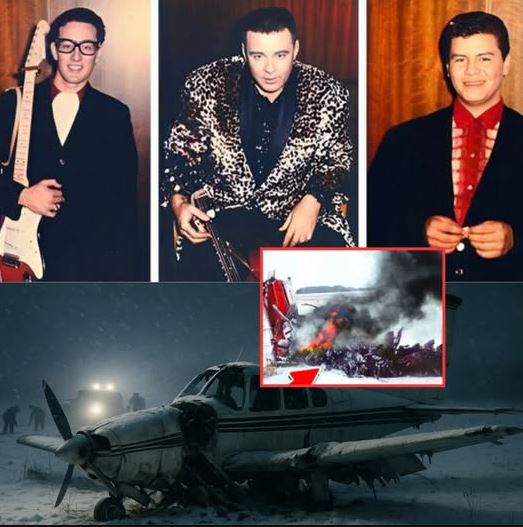
On February 3, 1959, the world of rock and roll was shaken to its core. A small charter plane carrying three of music’s brightest rising stars — Buddy Holly, Ritchie Valens, and J.P. “The Big Bopper” Richardson — crashed in the frozen fields of Iowa, cutting short lives that were destined to change music forever. This tragic event, later immortalized as “The Day the Music Died,” remains one of the most heartbreaking chapters in music history.
But beyond the headlines, the story of that final night is filled with human moments, chance decisions, and haunting details that make the tragedy even more poignant.
A Winter Tour Pushed to the Limits
The “Winter Dance Party” tour had already tested the endurance of its performers. Traveling night after night on unreliable buses in brutal Midwestern weather left the musicians sick, exhausted, and desperate for relief.
Determined to escape another freezing, uncomfortable bus ride, Buddy Holly arranged a small charter plane to take him and a couple of bandmates to the next stop. It seemed like a simple decision — but it would change the course of music history.
Fate Decided by Coin Toss and Last-Minute Swaps
Seats on the plane were limited, and not everyone could make the flight.
- Ritchie Valens, just 17 years old, won his seat after a fateful coin toss.
- The Big Bopper, battling the flu, managed to secure a spot in place of another band member.
- Other musicians, including Waylon Jennings, narrowly missed boarding — choices and twists of fate that would haunt them for the rest of their lives.
What looked like a stroke of luck at the time turned out to be a cruel twist of destiny.
The Fatal Takeoff
Shortly after midnight, the Beechcraft Bonanza single-engine aircraft departed Mason City, Iowa. The weather was treacherous — snow was falling, visibility was low, and the young 21-year-old pilot lacked full experience in navigating by instruments alone.
Mere minutes after takeoff, the plane lost control and crashed into a cornfield. The impact was fatal. All four aboard — Holly, Valens, Richardson, and the pilot — died instantly.
Rumors, Theories, and Lingering Questions
In the years since the crash, speculation has swirled. Some questioned whether mechanical failure or pilot error was to blame. Others fueled rumors about The Big Bopper possibly surviving the initial crash. A later autopsy confirmed, however, that all victims died on impact, silencing much of the speculation but not the fascination.
Dreams Cut Short
The tragedy robbed the world of artists who had only begun to leave their mark:
- Buddy Holly, just 22, had already revolutionized rock and roll with songs that inspired generations.
- Ritchie Valens, a teenager with hits like La Bamba, was destined for even greater stardom.
- The Big Bopper, known for his hit Chantilly Lace and his radio personality, was an energetic force in music and broadcasting.
Their loss was felt not only by fans but by the entire music industry.
A Legacy That Still Echoes
Though decades have passed, the memory of that night still resonates. The crash site near Clear Lake, Iowa has become a place of pilgrimage, where fans leave flowers, records, and heartfelt messages.
The tragedy was forever cemented in popular culture by Don McLean’s 1971 anthem American Pie, which dubbed February 3, 1959 as “The Day the Music Died.”
But perhaps more than anything, the story remains a reminder of how fragile life is — and how even the brightest stars can be extinguished too soon.
Final Thoughts
The haunting final flight of Buddy Holly, Ritchie Valens, and The Big Bopper is more than a headline from the past. It is a deeply human story of youth, ambition, fate, and loss. Their music continues to inspire, their names continue to be honored, and their final journey remains one of the most unforgettable tragedies in music history.
✨ SEO Keywords included naturally: Buddy Holly final flight, Ritchie Valens plane crash, The Big Bopper death, Day the Music Died, Winter Dance Party tour, Clear Lake Iowa crash.
